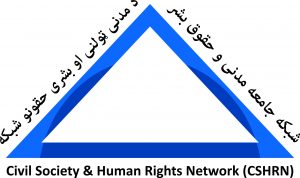Translation of an article by Razia Sayad
On 17 July 2008 CSHRN organized a gathering concerning the Paris Conference and the role of civil society in this conference.  Representatives of civil society who had participated in the Paris conference, some representatives of NGOs and representatives of the French and the Italian embassy were present. The gathering started at 9 o’clock after the reading of some verses of Holy Qhuraan by a participant. Mr. Naim Nazari, the coordinator of CSHRN, opened the discussion. The goal of this gathering was to discuss the role civil society played during decisions in the Paris Conference.
Representatives of civil society who had participated in the Paris conference, some representatives of NGOs and representatives of the French and the Italian embassy were present. The gathering started at 9 o’clock after the reading of some verses of Holy Qhuraan by a participant. Mr. Naim Nazari, the coordinator of CSHRN, opened the discussion. The goal of this gathering was to discuss the role civil society played during decisions in the Paris Conference.
Until 2008, Afghanistan and the international community organized a number of international conferences such as the Bonn, the Tokyo and the London conferences for the rehabilitation of Afghanistan. The Paris Conference took place within this series of conferences. The Paris Conference was an important gathering for reconsidering the reconstruction of Afghanistan by the international community. It was a positive point that before the Paris conference, a civil society gathering in Paris was organized, where representatives of national and international NGOs were present. CSHRN was represented by two participants at this conference. Topics discussed during the civil society conference in Paris were the role of civil society in the rehabilitation of Afghanistan, the human rights situation, how to support national and international actors in the rehabilitation of Afghanistan, how to involve the private sector in the reconstruction process and the effectiveness of the international aid were discussed. These topics were discussed in working groups and then the conclusions of the working groups were presented to everybody. The final conclusions were that a message would be conveyed to the state conference with the demands of civil society in view of the current situation in Afghanistan.
Before this conference in Paris, CSHRN organized a gathering among its members and developed a statement concerning the role of the Paris Conference in the rehabilitation of Afghanistan. The statement was conveyed to the participants of the Paris Conference by representatives of CSHRN.
Some of the suggestions brought up in the statement, in particular the ones in the field of human rights promotion and the strengthening of civil society, were included into the resolution of the Paris Conference. The representatives of civil society requested from the international community and the Afghan state more frequent dialogues between state institutions and civil society organizations.
Kabul gathering:
During the discussion in the gathering in Kabul, some of the participants criticized the way civil society was represented in the Paris Conference. They were of the opinion that more representatives of Afghan civil society should have been at the conference. This point was also supported by Mr. Hamid Mubarez, the chairperson of the National Union of Journalists, who participated in the Paris Conference. He explained that some of the representatives of civil society had not been prepared for a constructive and active participation and discussion during the conference. The next speaker of the gathering was Mrs. Suraya Parlika, the head of All Afghan Women Union. She said that there had been some representatives participating in the civil society conference in Paris, who did not believe in human rights. According to her, such an attitude would badly damage the role of civil society in Afghanistan. Then Mr. Aziz Rafiq, the executive director of ACSF, equally criticized the Paris Conference, saying that it had been a political action. However, he said that organizing such a conference in Paris was a positive achievement for the organizers. Another participant of the Paris conference was Mrs. Nagiba Ayubi, the head of the ‘Killid’ group. She said that the Paris Conference had been a good opportunity for the national and international media to show the reality of Afghanistan.
At the end of this gathering, Mr. Azaryuon Matin, the coordinatior of ICTJ in Afghanistan, who took the minutes of the gathering, announced the following conclusions of the meeting: According to the CSHRN statement, it is important that the international community as well as the Afghan government involve civil society in the process of decision making on important issues. The weakness of coordination between civil society and the national and international organizations led to a passive role of civil society in general. So the majority of the participants of the gathering asked for more dialogue and also more understanding amongst civil society in Afghanistan in order to create a common understanding of the challenges in Afghanistan.
